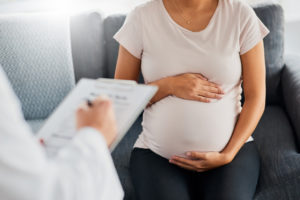 I read two studies recently that I think are important to pass on to others. In the first study, investigators performed a systematic review and meta-analysis of 77 studies including more than 8000 pregnant women with COVID-19. There were also many studies that also included non-pregnant women. In routine testing done on the pregnant women during hospital admission, 10% were positive for COVID-19. In COVID-19 positive women, the pregnant women were less likely than non-pregnant women to have fever and muscle pains. Pregnant women were more likely to be admitted to the intensive care unit and to require mechanical ventilation. Risk factors for more severe COVID-19 disease were the same for pregnant women and non-pregnant women, and include older age, diabetes, hypertension and obesity. The rates of preterm birth appeared to be higher in women with COVID-19.
I read two studies recently that I think are important to pass on to others. In the first study, investigators performed a systematic review and meta-analysis of 77 studies including more than 8000 pregnant women with COVID-19. There were also many studies that also included non-pregnant women. In routine testing done on the pregnant women during hospital admission, 10% were positive for COVID-19. In COVID-19 positive women, the pregnant women were less likely than non-pregnant women to have fever and muscle pains. Pregnant women were more likely to be admitted to the intensive care unit and to require mechanical ventilation. Risk factors for more severe COVID-19 disease were the same for pregnant women and non-pregnant women, and include older age, diabetes, hypertension and obesity. The rates of preterm birth appeared to be higher in women with COVID-19.
Commentary: We have known for some time that influenza has a worse outcome among pregnant women than nonpregnant women. This is likely due to the immunological changes during pregnancy as well as alterations in respiratory physiology. Now we have learned that COVID-19 appears to have a more severe course in pregnant women and with the same preexisting conditions issues as in nonpregnant women.
Now the scientists and researchers will be moving on to the safety and efficacy of SARS-CoV-2 vaccines in pregnant women.
Reference: Allotey J, et al. Clinical manifestations, risk factors, and maternal and perinatal outcomes of coronavirus disease 2019 in pregnancy: Living systematic review and meta0analysis. BMJ 2020 Sept 1; 370.
The second study involved experiments done related to human breast milk and transmission of SARS-CoV-2. Human breast milk contains antibodies that offer much protection to infants however, some viruses can be transmitted through breast-feeding. An experiment was done to study 64 milk samples from 18 mothers infected with SARS-cCoV-2 both before and after a COVID-19 diagnosis. In conjunction, samples of human milk were also experimentally infected with SARS-CoV-2. Seventeen of the mothers had symptomatic COVID-19, and there were no milk samples that contained any replication-competent virus. In the experimentally infected milk samples, pasteurization of the samples, as is done in human milk banks, eliminated all viral RNA.
Commentary: In this small study, reassurance is offered that COVID-19 should not disrupt breast feeding or alter the use of human milk banks. The importance of breast feeding is well known for infant health, but it also reduces the risk for breast and ovarian cancer, diabetes and cardiovascular disease. For now, we should support and encourage breast feeding even in those women who have COVID-19.
Reference: Chambers C, et al. Evaluation for SARS-CoV-2 in breast milk from 18 infected women. JAMA 2020 Aug 19, e-pub.

